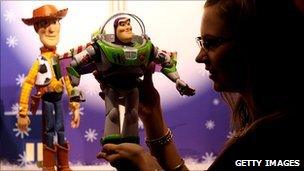Christmas toy market faces China crisis
- Published
Children test the toys expected to be the top sellers this Christmas
It's November, and by mid-afternoon London's streets are already shrouded in autumnal twilight. There's a bitter chill in the air.
Yet the city's shopping districts are brightly lit, colourfully decorated and thronging with people. Christmas may be more than a month away, but in the slightly surreal world of seasonal retailing, it's here already.
Outside Hamleys, the giant toy emporium on Regent Street, Snow White is calling out a welcome to passers-by, while beside her, a man in bright orange top hat and tails ushers eager customers into the shop.
Inside, trade is brisk - and noisy. For toy stores, this is by far the most important time of year. Shelves are stacked from floor to ceiling with a bewildering array of garishly packaged products, from teddy bears to train sets.
But predicting which toys are going to be the top sellers can be something of a black art, especially as orders need to be placed up to a year in advance.
"This year, we think Buzz Lightyear is going to be very big," says Hamleys' manager Gareth Davies Marriot, pointing to a large, green spaceman figure.
"Kids have seen the film Toy Story 3 and want to recreate those moments at home.
"I'm also keen on Stinky the Garbage Truck, which eats toy cars. That's my personal favourite."
Factory fears
Yet as we have seen in the past, toy stores can get it wrong and be caught out by unexpected demand - leaving harassed parents to squabble over dwindling stocks of a must-have product.
"We always get caught out by something," admits Mr Davies Marriott.
"What tends to happen is one child gets a toy as a present and suddenly everyone in the playground wants one for Christmas, and suddenly they're flying off the shelves."
But this year, the risk of a toy shortage is higher than ever. And this time, the reason lies in China, where a large proportion of the toys sold in Europe and North America are made.

Toy shops are pinning their hopes on Buzz Lightyear this year
Most of China's toy factories are based in the south of the country, in southern coastal areas such as Guangzhou, Shenzhen and Zhuhai.
In the past, these factories have relied on a steady, and cheap, supply of migrant labour from poorer parts of the country where work has been less readily available.
Now, though, the supply is drying up. The government in Beijing has been investing huge sums recently to promote development in inland regions.
As salaries there have risen and more jobs become available, the migrant workforce has been dwindling, forcing the southern factories to slow production.
Export costs
That is already causing headaches for their customers, according to Alan Simpson, managing director of the independent toy retailer Toytown.
"Three million Chinese didn't return to the toy factories of southern China after the Chinese New Year," he says.
"That is obviously having an impact on supply. Last year we would have been able to react to customer demand in September and still have goods on our shelves in time for Christmas.
"This year we would probably need to have ordered in July in order to get stock in on time. So if a line is very popular, we simply cannot respond quickly enough.
"Ultimately, that means there will be a shortage."
There are other reasons, too, why supplies may be difficult to get hold of this year.
Producing toys for export in China has become more expensive, thanks to stricter safety rules imposed by the EU, the US and by China's own government, prompting some factories to close.
Bad weather in China earlier this year has also slowed production.
"There's always potential for a shortage of supplies at Christmas," says Neil Saunders, a retail analyst with Verdict Research.
"There's always that must-have toy and we always run short. But that could be exacerbated this year because the supply out of China hasn't been as great as it should have been. We could easily see some of the popular items run out.
"And that's potentially very dangerous, because the window for selling these products is very short, and if the products aren't there to sell, then nobody's going to make any money on them."
That's bad news for retailers - and for parents.
This year, they might do well to get their Christmas shopping done early, or face the prospect of an undignified scramble to claim the last Stinky in the shop.
- Published28 October 2010
- Published27 October 2010
- Published26 October 2010
- Published17 September 2010